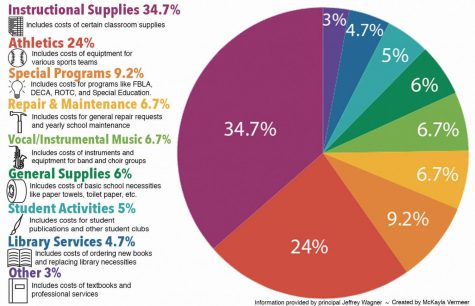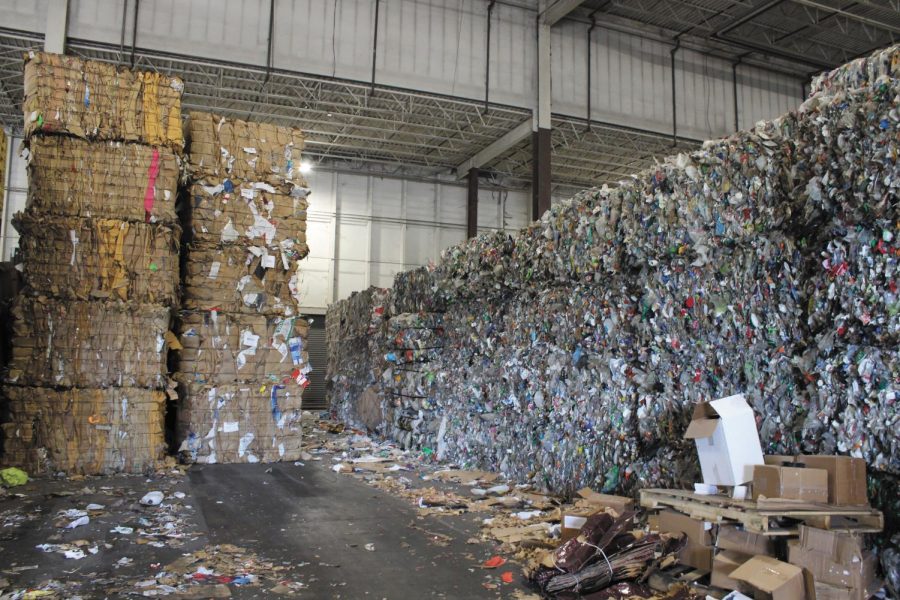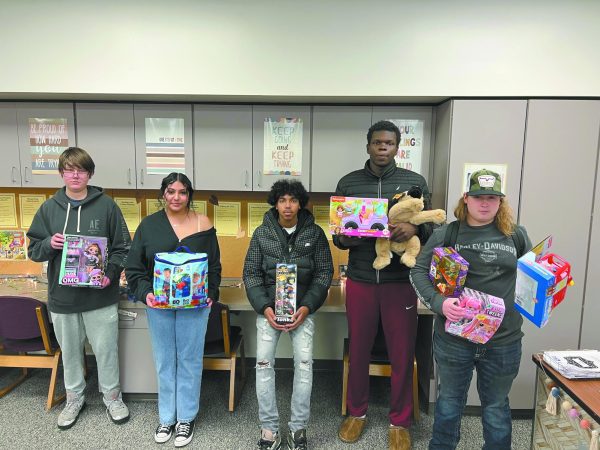BPS trash hauler no longer accepting recyclables
More stories from Emily Nelson
Premier Waste Solutions stopped accepting recyclables from BPS due to contamination. “Right now [Firstar’s] biggest challenge is the other products are harder for them to move. If you went down there and just drove into the place a bit, you will see bales of product sitting outside,” Premier manager Mike Shrader said. Photo by McKenzie Gandy.
Premier Waste Solutions’ processor decided to halt the acceptance of single stream recyclables through commercial businesses. Because Bellevue Public Schools is contracted with Premier, they no longer accept recyclables.
“We have a trash contract with Premier that we have had for several years and part of that was recycling where they picked up paper, plastic, and cardboard,” Superintendent Jeff Rippe said. “This summer they notified us that they would no longer pick up anything other than clean cardboard. If we had our choice we would be continuing to do exactly what we were doing, but unfortunately they made that decision as our vendor.”
Premier manager Mike Shrader said a number of factors went into this decision. He said that one of the issues is the contamination rate in the recyclables and that about a year ago, their processor told them that the contamination rate was too high. Another problem is simply the lack of a market for recyclables.
“There’s just no money in recycling and it has been like this for a long time, so these processors are struggling,” Shrader said. “So now, us haulers, are paying them a higher tipping fee. We were paying $30 a ton, but they have raised it within the past 60 days to where now we are paying $110 a ton.”
Senior Derek Schutt said he did not understand the change and thought it was a joke at first. He said it is important to recycle and it is not a good look for BPS.
“I hope they fix this and we can recycle again,” Schutt said. “I get we have Schoology, but at least make that stuff work and not hand out paper assignments and tests if you are going to completely stop recycling besides cardboard.”
Biology teacher Rachel Carraher said she also sees great importance in continuing to recycle. Carraher takes recyclables in her classroom home and believes that the halt of recycling is sad.
“Recycling helps to keep reusable items out of the landfill to give them another life,” Carraher said. “It is still not the best practice, but it does help.”
Carraher said that America used to ship a lot of its plastic overseas to China. Last year, China quit taking the plastic and now there is a build up of plastic with fewer places wanting the materials.
“The best thing we can do is reduce our consumption of these products,” Carraher said. “They are energy intensive to make and recycle.”
Green Bellevue, a volunteer based environmentally friendly organization, offered to lend a helping hand to BPS in any way they can. Current President Don Preister agreed with Carraher and wanted to find a way to take action other than recycling.
“What Green Bellevue is seeking to do is find more options,” Preister said. ”So if we can not recycle some things, what else can we recycle? For example, we are looking at starting a program in the cafeteria where the food waste can be composted.”
Principal Jeff Wagner said East needs to focus on new ways to recycle as well, including looking at whether or not East can make something more sustainable, steer away from styrofoam plates, and even plastic bottles.
“Over the past three years we put in all of the water fountains to try to promote the use of containers for water and I think a lot of students use that so it is a positive benefit for us,” Wagner said. “Part of having the HVAC system is a lower energy cost plus our LED lights we put up now in the front hallway and stadium. Anything you can do to decrease that footprint is trying to be more socially responsible.”
Along with Green Bellevue’s attempt to help, Rippe said BPS is open to any suggestions. Rippe said BPS has no problem with continuing to recycle. The issue is who is going to pick it up.
“I appreciate those staff members who are willing to take their own stuff home with them and if students want to do the same thing they are welcome to do that,” Rippe said.
Green Bellevue wanted to lend a helping hand to teachers and students willing to take home products as well.
“What we are hoping to do is to get a green team of teachers who have an interest in recycling to contact us through email so we can network together,” Preister said. “Some classes I know are collecting their own recycling in the school and some students and teachers are taking it home. We want to help coordinate who is doing what and what things they have found to be successful.”
BPS will bid out in search of a new contract for recycling in a year. In the meantime, Rippe said he encourages students and teachers to reach out to him or Wagner with their ideas. Shrader said he hopes for a new recycling plan in the future, but change is needed.
“We are optimistic that at some point the market is going to change,” Shrader said. “As for the product change, we need to give them a consistent, really good product for a period of time. The biggest thing [Firstar] wanted us to do is give a wake up call to all of our commercial people saying we just cannot throw anything in there, you need to police this.”
Shrader said rather than contaminating an entire load of recyclables, simply throw that dirty cup away. People still want to have that cup recycled, but they do not want to take the time to clean it out.
“You have to give these processors a clean product. We are not doing our job, but the processor is doing his,” Shrader said. “We, as a community, are not doing our job. We are not giving whoever is collecting this product from your home, or school, or wherever a clean product that they can take on to the processor.”







![Discussion time. At an Ollin meeting on Dec. 4 (from left) sophomores Samuel Kucinsky, David Baker, Xavier Swotek, Ivan Gomez, and Joel Aguirre discuss the meaning of palabra, meaning “word” in Spanish. Ollin is the young men’s leadership group with the Latino Center of the Midlands. “While these initiatives are framed as leadership development programs, they extend far beyond that.They function as healing circles, offering a secure space for individuals to express themselves [and] share their experiences,” Ollin facilitator José Avalos said.](https://thechieftainspear.org/wp-content/uploads/2023/12/latinocenterofthemidlands-600x450.jpg)